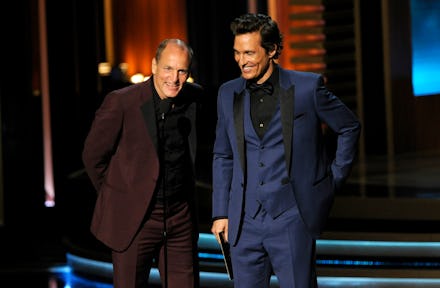It's Clear Who's to Thank for the Golden Age of Television: Movies

If you turned to NBC on Monday night, you might have thought for a moment you were tuning into the Oscars instead of the Emmys. The Emmys celebrate excellence in television, so why did the producers, presenters and even the winners give so much more attention to the movie stars in attendance?
Matthew McConaughey, Woody Harrelson, Julia Roberts and Mark Ruffalo may not have picked up an Emmy, but they were the subjects of such fawning and flattery that they each surely went home feeling like winners. The praise they received, though, calls into question the conventional acknowledgement that we are in the middle of the "golden age of television."
It all started with Jimmy Kimmel's extended riff about McConaughey being too attractive for the Emmys — and that was hardly the end of it. When Fargo won for Best Miniseries/Movie, showrunner Noah Hawley thanked Joel and Ethan Coen (who scripted the film version and were the show's executive producers) but noted with reverence that "They don''t watch the Emmys."
Ryan Murphy, director of HBO's The Normal Heart, reminded viewers during his acceptance speech that, during the film's long road to the small screen, "It took the superpowers of Erin Brockovich and the Incredible Hulk [Roberts and Ruffalo, respectively] to keep this thing alive." In other words, without the cache of movie stars, the best television movie of the year would not have even been made.
Image Credit: Getty
Some of the fawning was more subtle. You heard it in the way Roberts, when announcing the nominees for Best Actor in a Male Drama, laughed and lingered over the names of McConaughey and Harrelson, as if they all belonged to some sort of secret club. And by the fact that Halle Berry presented the final and most prestigious award of the night, Outstanding Drama Series, despite the fact that her summer series Extant was a major disappointment.
Image Credit: Getty
Why does this matter? For years now, critics have sold us the narrative that television has become the place where serious artists go to do serious work. It is true that the movie industry has become too risk averse, and that it is difficult to get the green light for any type of original story that is not built around a comic book character or some other pre-existing property. That's why the actors listed above (as well as Kevin Spacey, Robin Wright, Billy Bob Thornton and others) have migrated from the silver to the small screen.
Monday night showed that the narrative of television as the artistic, studious younger sibling to film's older jock has been overstated. Or rather, now that the cool kid is sitting at the nerd's table, the nerds have forgotten all about their art and just want to hear what it's like to be popular.
It is easy to understand why the Academy of Television Arts and Sciences would want to draw attention to the fact that movie stars of McConaughey's and Roberts' stature would choose to work in their medium, but the constant attention given to movie stars at the Emmys this year came at the expense of those artists whose work has made this golden age of television so special.
Monday night should have belonged to Breaking Bad's Aaron Paul (who became the first actor ever to win Outstanding Supporting Actor in a Drama Series three times) and Anna Gunn (her second supporting actress Emmy portraying Skyler White), and Margulies (her third Emmy and second for the terrific The Good Wife), but none of them have made the jump to film and were apparently deemed less worthy of airtime.
Image Credit: AP Images
They actually had to win an award to be heard, which was not required of the movie stars in attendance. While each of them went home with a trophy, it was the movie stars who soaked up the spotlight, a truth that highlights the enduring allure of the movie star at a time when film itself has little use for them.